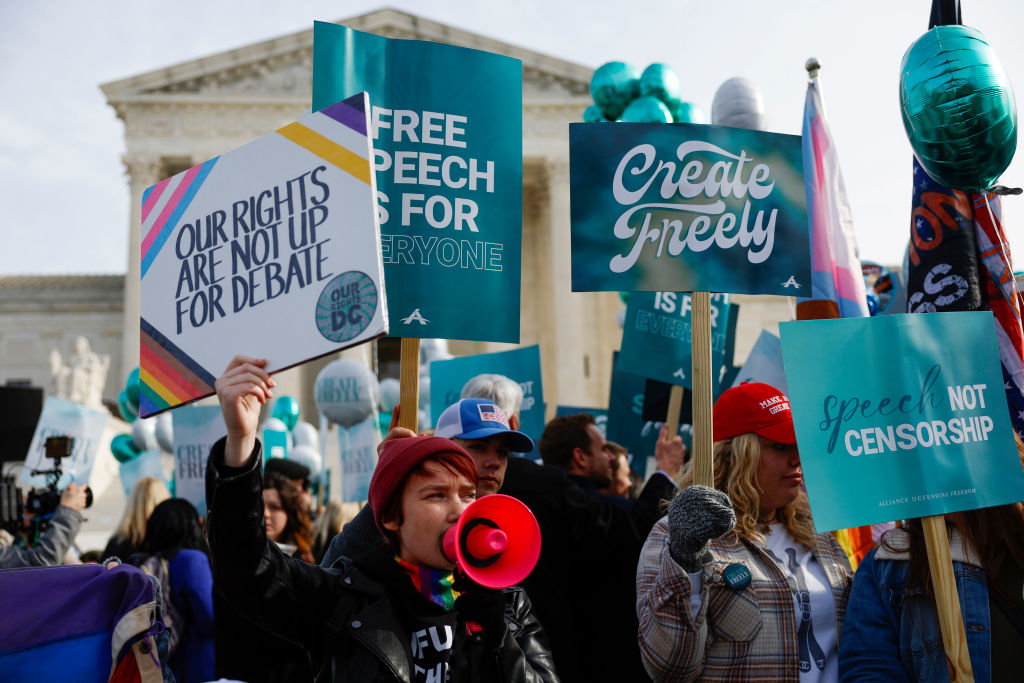Supreme Court rules businesses can turn away same-sex couples, despite anti-discrimination law


A free daily email with the biggest news stories of the day – and the best features from TheWeek.com
You are now subscribed
Your newsletter sign-up was successful
The Supreme Court sided with a Christan graphic artist from Colorado who argued her beliefs prohibited her from creating wedding sites for same-sex couples, despite the state's anti-discrimination laws. In a 6-3 vote, the conservative majority ruled that "the First Amendment prohibits Colorado from forcing a website designer to create expressive designs speaking messages with which the designer disagrees," The New York Times summarized.
The decision came on the same day court rejected Biden's student loan forgiveness plan and a day after striking down affirmative action. "The First Amendment envisions the United States as a rich and complex place where all persons are free to think and speak as they wish, not as the government demands," Justice Neil Gorsuch wrote in the majority opinion.
In what is being "framed as a clash between free speech and gay rights," the case was the latest blow in a series of Supreme Court decisions that favored religious freedom, the Times added. The court ruling "also appeared to suggest that the rights of LGBTQ people, including to same-sex marriage, are on more vulnerable legal footing," the Times added, "particularly when they are at odds with claims of religious freedom."
The Week
Escape your echo chamber. Get the facts behind the news, plus analysis from multiple perspectives.

Sign up for The Week's Free Newsletters
From our morning news briefing to a weekly Good News Newsletter, get the best of The Week delivered directly to your inbox.
From our morning news briefing to a weekly Good News Newsletter, get the best of The Week delivered directly to your inbox.
Justice Sonia Sotomayor called the ruling "profoundly wrong" in the dissenting opinion. "Today, the Court, for the first time in its history, grants a business open to the public a constitutional right to refuse to serve members of a protected class," she wrote, calling it a "sad day in American constitutional law and the lives of LGBT people." She also suggested the decision could have far-reaching consequences. She added that the ruling "threatens to balkanize the market and to allow the exclusion of other groups from many services."
At a news conference Friday, the artist at the center of the case, Lorie Smith, said she was grateful to the court, which "affirmed today that Colorado can't force me or anyone to say something we don't believe."
A free daily email with the biggest news stories of the day – and the best features from TheWeek.com
Theara Coleman has worked as a staff writer at The Week since September 2022. She frequently writes about technology, education, literature and general news. She was previously a contributing writer and assistant editor at Honeysuckle Magazine, where she covered racial politics and cannabis industry news.
-
 Local elections 2026: where are they and who is expected to win?
Local elections 2026: where are they and who is expected to win?The Explainer Labour is braced for heavy losses and U-turn on postponing some council elections hasn’t helped the party’s prospects
-
 6 of the world’s most accessible destinations
6 of the world’s most accessible destinationsThe Week Recommends Experience all of Berlin, Singapore and Sydney
-
 How the FCC’s ‘equal time’ rule works
How the FCC’s ‘equal time’ rule worksIn the Spotlight The law is at the heart of the Colbert-CBS conflict
-
 Witkoff and Kushner tackle Ukraine, Iran in Geneva
Witkoff and Kushner tackle Ukraine, Iran in GenevaSpeed Read Steve Witkoff and Jared Kushner held negotiations aimed at securing a nuclear deal with Iran and an end to Russia’s war in Ukraine
-
 Pentagon spokesperson forced out as DHS’s resigns
Pentagon spokesperson forced out as DHS’s resignsSpeed Read Senior military adviser Col. David Butler was fired by Pete Hegseth and Homeland Security spokesperson Tricia McLaughlin is resigning
-
 Judge orders Washington slavery exhibit restored
Judge orders Washington slavery exhibit restoredSpeed Read The Trump administration took down displays about slavery at the President’s House Site in Philadelphia
-
 Hyatt chair joins growing list of Epstein files losers
Hyatt chair joins growing list of Epstein files losersSpeed Read Thomas Pritzker stepped down as executive chair of the Hyatt Hotels Corporation over his ties with Jeffrey Epstein and Ghislaine Maxwell
-
 Judge blocks Hegseth from punishing Kelly over video
Judge blocks Hegseth from punishing Kelly over videoSpeed Read Defense Secretary Pete Hegseth pushed for the senator to be demoted over a video in which he reminds military officials they should refuse illegal orders
-
 Trump’s EPA kills legal basis for federal climate policy
Trump’s EPA kills legal basis for federal climate policySpeed Read The government’s authority to regulate several planet-warming pollutants has been repealed
-
 House votes to end Trump’s Canada tariffs
House votes to end Trump’s Canada tariffsSpeed Read Six Republicans joined with Democrats to repeal the president’s tariffs
-
 Bondi, Democrats clash over Epstein in hearing
Bondi, Democrats clash over Epstein in hearingSpeed Read Attorney General Pam Bondi ignored survivors of convicted sex offender Jeffrey Epstein and demanded that Democrats apologize to Trump
